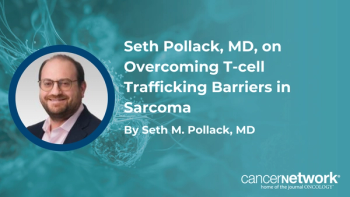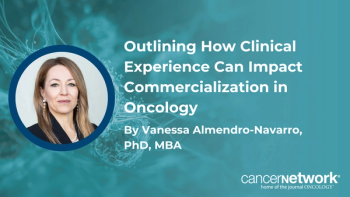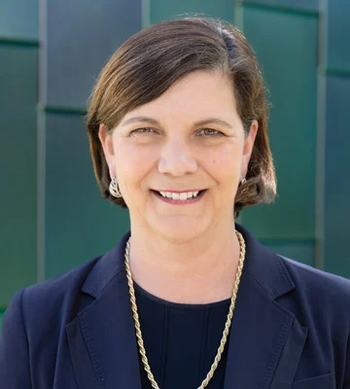
Oncology NEWS International
- Oncology NEWS International Vol 7 No 10
- Volume 7
- Issue 10
Academic and Community Bone Marrow Transplant Centers Urged to Form Partnerships
ORLANDO--An ongoing debate within the health care industry is focusing on whether bone marrow and peripheral blood stem cell transplants (BMT/PBSCT) should be regionalized in academic centers or diffused to community hospitals.
ORLANDO--An ongoing debate within the health care industry is focusing on whether bone marrow and peripheral blood stem cell transplants (BMT/PBSCT) should be regionalized in academic centers or diffused to community hospitals.
At a transplant seminar, sponsored by IBC/Infoline, two consultants specializing in oncology consulting and program development, said that academic transplant centers must make their programs more efficient to compete with community centers.
Ultimately, however, they recommend cooperation between academic and community centers, with the goal of forging partnerships for performing transplant procedures.
Thomas A. Paivanas, MHSA, founding director of Thomas A. Paivanas & Associates, Annandale, Virginia, and Patti Jamieson, MSSW, MBA, administrator of the Oncology Service Line at the University of Illinoiss Chicago Medical Center, said that despite much interest, relatively few community centers have been able to develop high-volume transplant programs to date.
"Of more than 500 Association of Community Cancer Centers (ACCC) member institutions, 115 (23%) report having BMT programs, but only 16% have annual volumes of 50 patients or more, 45% have annual volumes of fewer than 25 patients, and nearly 30% report no volume at all!" Mr. Paivanas said.
His firm has conducted a number of oncology-specific surveys, one of which includes the BMT/PBSCT industry. This phone survey of academic and community-based BMT/PBSCT programs with volumes greater than 70 patients per year solicited opinions and information regarding operations, changing clinical indications, and the fiscal impact of managed care contracting on BMT/PBSCT.
The survey showed an average global price for autologous transplants of $65,000 to $90,000 and for allogeneic transplants, $115,000 to $125,000. The amount allotted for professional services ranged from about 10% to 15% of the global price. For autologous transplants, the average length of stay is 8 to 20 days and for allogeneic transplants, 18 to 45 days, the survey found.
The ratio of autologous to allogeneic transplants averaged 70 to 30. "Generally, more autologous bone marrow transplants are done in the community setting and more allogeneic transplants are done in an academic setting," Ms. Jamieson said, "but we see that changing in the future."
In global contracting, some payers have requested that services be included from pretreatment to 360 days post-transplant. However, the study suggests that those clinically and financially viable programs have successfully negotiated more realistic time frames; defined services that are included and excluded; and installed stop loss and outlier provisions. Additionally, the consultants said, retaining the option to re-negotiate and the ability to effect continuous contract management are critical for leveling the managed care playing field.
Academic bone marrow transplant programs did not fare well overall in the survey. They were characterized by higher costs and prices and higher inpatient average length of stay.
"These programs often do not do a good job of integrating clinical control and financial revenue," the consultants said. "They may suffer from disjointed contracting; an unclear mission for oncology services; a mosaic of reimbursement and compensation arrangements; an adversarial decision-making process exacerbated by personalities and politics; and organizational paralysis preventing the development or evolution of efficient business operations."
They said that academic institutions need to learn the "tricks of the trade" from their private sector colleagues, particularly in terms of contracting and patient management. Managed care contract negotiations are particularly challenging, as each contract is different, all are complicated, and programs may take significant financial risk, often without accurate clinical and accounting systems.
"The administrator must have superlative talent and be truly empowered in order to work effectively with the program, referring physicians, and payer representatives," Mr. Paivanas said.
Combining Resources
Competition for transplant services will increase in the future, and forming partnerships is almost always preferable to competing, they said, especially with community programs. They cited the success of the H. Lee Moffitt Cancer Center in combining the best of community-based oncology care with the academic resources of its affiliate, the University of South Florida College of Medicine.
They noted a trend toward payers approaching academic institutions directly to discuss partnership arrangements. [See Oncology News International, July, 1998,] for a description of a community outreach program involving the Hutchinson Cancer Research Center and 16 community transplant centers.]
"However, you have to successfully partner internally before you can successfully partner with anyone externally," Mr. Paivanas cautioned. "And dont compete exclusively on price. Instead, focus on setting the standard of care in your region."
Articles in this issue
over 27 years ago
Panel Recommends Photofrin for Use in Late-Stage Lung Cancerover 27 years ago
California Intervention Raises Consumption of Fruits and Vegetablesover 27 years ago
ODAC Panel Okays Nolvadex to Reduce Breast Cancer Riskover 27 years ago
Evolving Role for Preoperative Chemo in Breast Cancerover 27 years ago
NCI Sets Sail on a New Tack In the Stormy Seas of CAMover 27 years ago
Opioid Antagonists Can Control Opioid-Induced Constipationover 27 years ago
NCI Seeks New Technologiesover 27 years ago
NIAID Collaborates With VaxGen, Inc. on Trials of AIDSVAXover 27 years ago
Clinicians Often Fail To Provide Adequate Genetic CounselingNewsletter
Stay up to date on recent advances in the multidisciplinary approach to cancer.





































